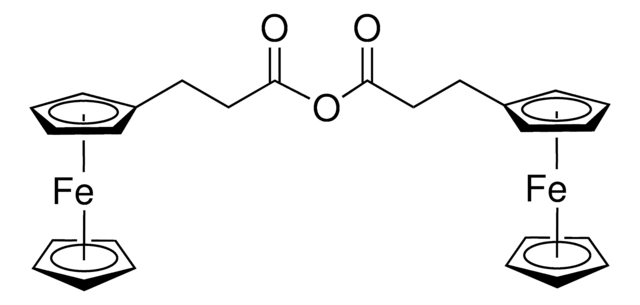91204
Acetic anhydride
for GC derivatization, LiChropur™, ≥99.0%
About This Item
Produits recommandés
Qualité
for GC derivatization
LiChropur™
Niveau de qualité
Densité de vapeur
3.5 (vs air)
Pression de vapeur
10 mmHg ( 36 °C)
4 mmHg ( 20 °C)
Pureté
≥99.0% (GC)
≥99.0%
Forme
liquid
Température d'inflammation spontanée
629 °F
Limite d'explosivité
10.3 %
Pertinence de la réaction
reagent type: derivatization reagent
reaction type: Acylations
Technique(s)
gas chromatography (GC): suitable
Résidus d'évap.
≤0.003%
Indice de réfraction
n20/D 1.390 (lit.)
Point d'ébullition
138-140 °C (lit.)
Pf
−73 °C (lit.)
Solubilité
H2O: slightly soluble
Densité
1.08 g/mL (lit.)
Chaîne SMILES
CC(=O)OC(C)=O
InChI
1S/C4H6O3/c1-3(5)7-4(2)6/h1-2H3
Clé InChI
WFDIJRYMOXRFFG-UHFFFAOYSA-N
Vous recherchez des produits similaires ? Visite Guide de comparaison des produits
Description générale
- It increases the stability of compounds by protecting unstable groups.
- It may render volatility on substances like carbohydrates or amino acids, that have several polar groups that they are non-volatile and generally decompose on heating.
- It allows the separations not possible with underivatized compounds.
- Compounds are detectable at very low levels with an ECD.
Acetic anhydride is a reagent utilized to form fragmentation-directing derivatives for GC/MS analysis.
Application
Autres remarques
Informations légales
Mention d'avertissement
Danger
Mentions de danger
Classification des risques
Acute Tox. 2 Inhalation - Acute Tox. 4 Oral - Eye Dam. 1 - Flam. Liq. 3 - Skin Corr. 1B
Code de la classe de stockage
3 - Flammable liquids
Classe de danger pour l'eau (WGK)
WGK 1
Point d'éclair (°F)
120.2 °F - closed cup
Point d'éclair (°C)
49 °C - closed cup
Équipement de protection individuelle
Faceshields, Gloves, Goggles, type ABEK (EN14387) respirator filter
Faites votre choix parmi les versions les plus récentes :
Déjà en possession de ce produit ?
Retrouvez la documentation relative aux produits que vous avez récemment achetés dans la Bibliothèque de documents.
Les clients ont également consulté
Notre équipe de scientifiques dispose d'une expérience dans tous les secteurs de la recherche, notamment en sciences de la vie, science des matériaux, synthèse chimique, chromatographie, analyse et dans de nombreux autres domaines..
Contacter notre Service technique











